Roofing Companies Rothesay
Top Roofing Services in Rothesay
Receive multiple Roofing Companies quotes for your project today! Compare profiles, reviews, accreditations, portfolio, etc... and choose the best offer.
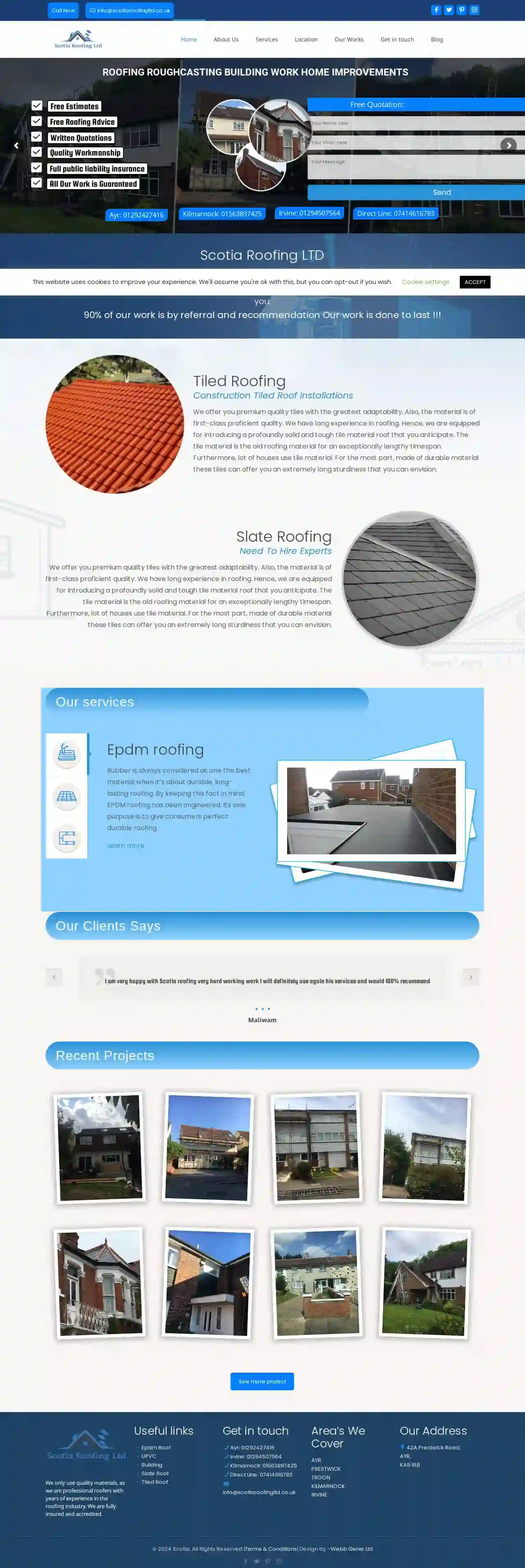
SCOTIA ROOFING LTD
51 reviewsAyers View, Little Mill, Ayr, KA77HJ, GBScotia Roofing LTD is a renowned roofing company dedicated to providing high-quality roofing services at competitive prices. With years of experience in the industry, our team of professional roofers uses only the best materials to ensure long-lasting and durable results. We are fully insured and accredited, giving you peace of mind knowing that your project is in safe hands. From new roof construction to repairs and maintenance, we offer a comprehensive range of services to meet all your roofing needs. Our commitment to customer satisfaction is unwavering, and we strive to make the roofing process as smooth and stress-free as possible. Whether you need a tiled roof, a slate roof, EPDM roofing, or UPVC roofing, Scotia Roofing LTD is your trusted partner for all your roofing solutions.
- Services
- Why Us?
- Accreditations
- Our Team
- Testimonials
- Gallery
Get Quote
Norside Ltd
38 reviews21 St Mungo St, Bishopbriggs, G64 1QT, GBNorside is a roofing, general builders and multi trade company based in the Bishopbriggs area of Glasgow. Managing director Paul Smith started out as a sole trader, establishing Norside as a Limited company in 1996. Originally started as a roofing company, Norside has steadily progressed into general building and all trades, offering a varied service from roofing to refurbishments. We have a vast range of experience in all aspects of the construction industry. Norside deals with both private & commercial work. Renovations & extensions are carried out to the highest standard. We deal with all types of roofs and have over 30 years of experience. Over the last 25 years, Norside Ltd has moved into insurance works. Regular maintenance is important to properties, let us take care of it for you. Norside provides its own scaffold and scaffolders, who build and maintain the scaffold. Roof Maintenance Roofs are like cars and need maintained. Don't get caught out this winter. Call us now to book your annual roof maintenance check. 24hr Emergency Call Out Service – 07973634684 07812543545 07976321929 If you have a question, please contact at [email protected]
- Services
- Why Us?
- Our Team
- Gallery
Get Quote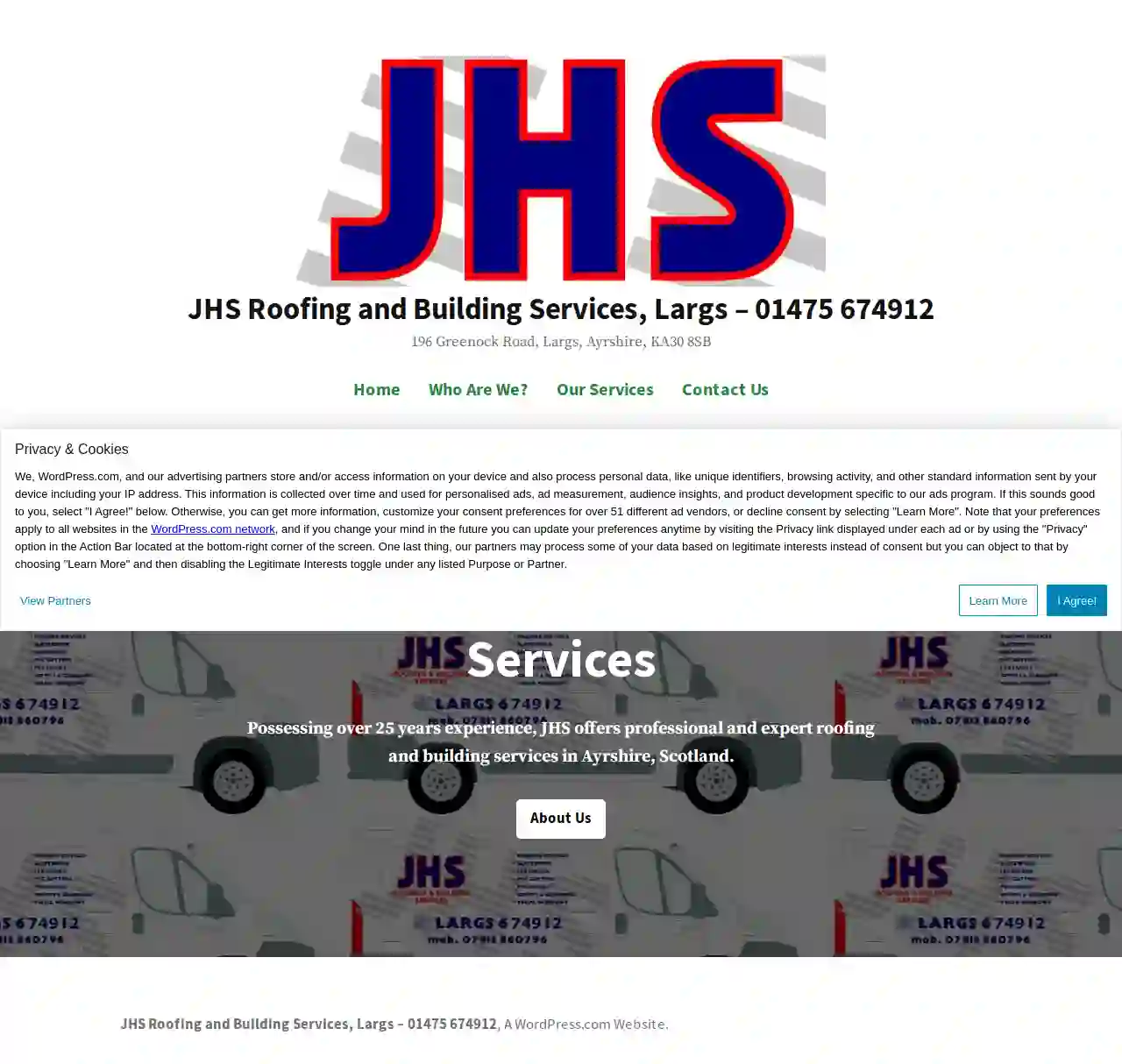
JHS Roofing and Building Services
52 reviews196 Greenock Road, Largs, KA30 8SB, GBJHS Roofing and Building Services, based in Largs, Ayrshire, Scotland, boasts over 25 years of experience in providing professional and expert roofing and building services throughout Ayrshire.
- Services
- Why Us?
- Gallery
Get Quote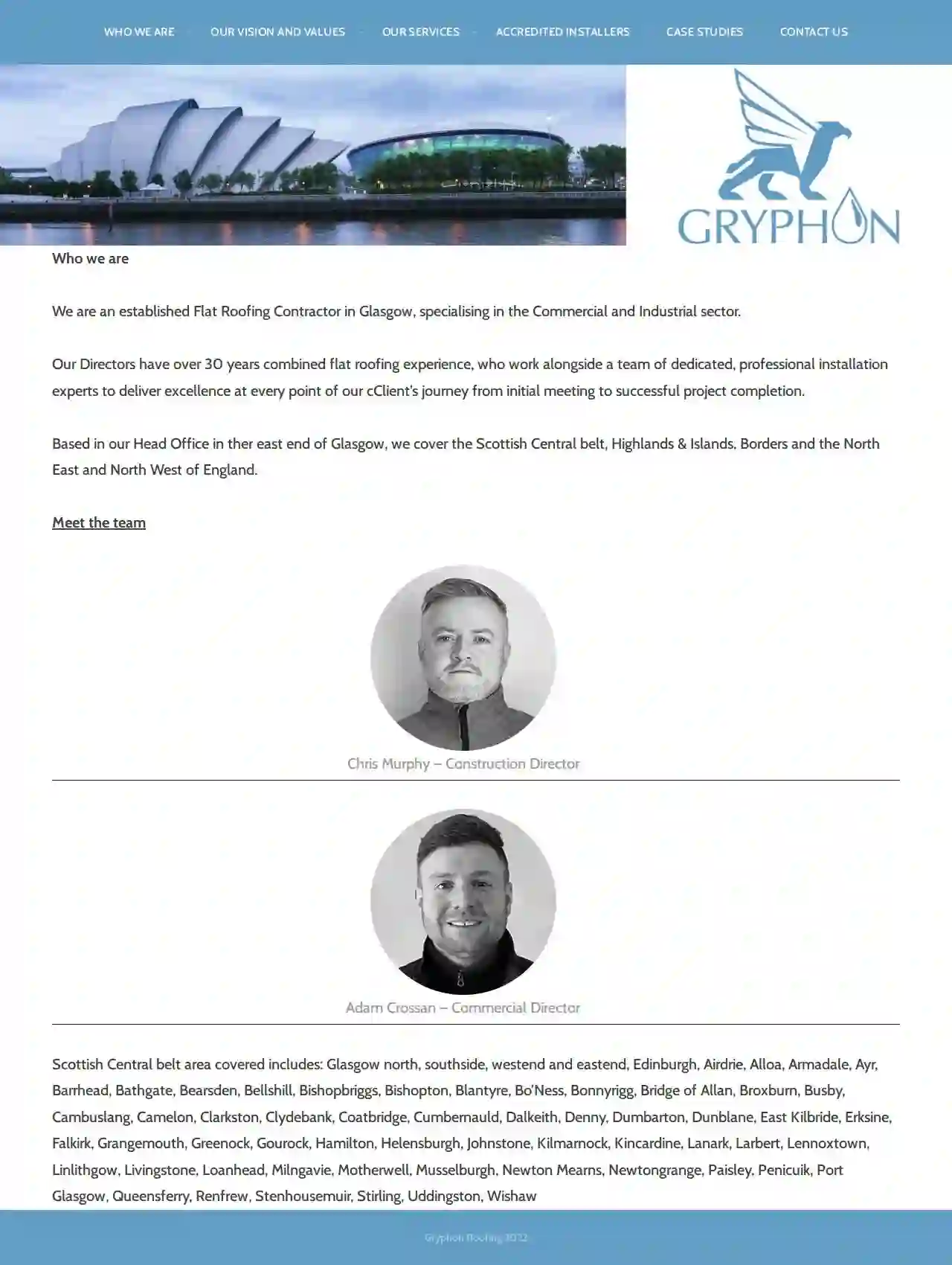
Gryphon Roofing Solutions Ltd
Unit 10, 12-14, Eastvale Industrial Estate, Glasgow, G40 1AA, GBWe are an established Flat Roofing Contractor in Glasgow, specialising in the Commercial and Industrial sector. Our Directors have over 30 years combined flat roofing experience, who work alongside a team of dedicated, professional installation experts to deliver excellence at every point of our client's journey from initial meeting to successful project completion. Based in our Head Office in the east end of Glasgow, we cover the Scottish Central belt, Highlands & Islands, Borders and the North East and North West of England.
- Services
- Why Us?
- Our Team
- Gallery
Get Quote
Roofers Kilmarnock
54 reviews58 Blair Avenue, Kilmarnock, KA1 5BE, GBRoofers Kilmarnock is a local roofing company based in Kilmarnock, Ayrshire, led by Joe, who has years of experience handling various roofing issues in the area. They serve both residential and commercial clients, including larger industrial warehouses. The company prioritizes providing fair and honest roofing repairs and installations, including emergency roof repairs, understanding the stress a leaking roof can cause. They offer a wide range of services, from repairs and installations to cleaning and maintenance, ensuring they can meet diverse customer needs. Roofers Kilmarnock emphasizes a flexible approach, working with clients who already have materials or need supply and fit services. They are committed to providing high-quality services and maintaining their reputation for honesty and hard work.
- Services
- Why Us?
- Gallery
Get Quote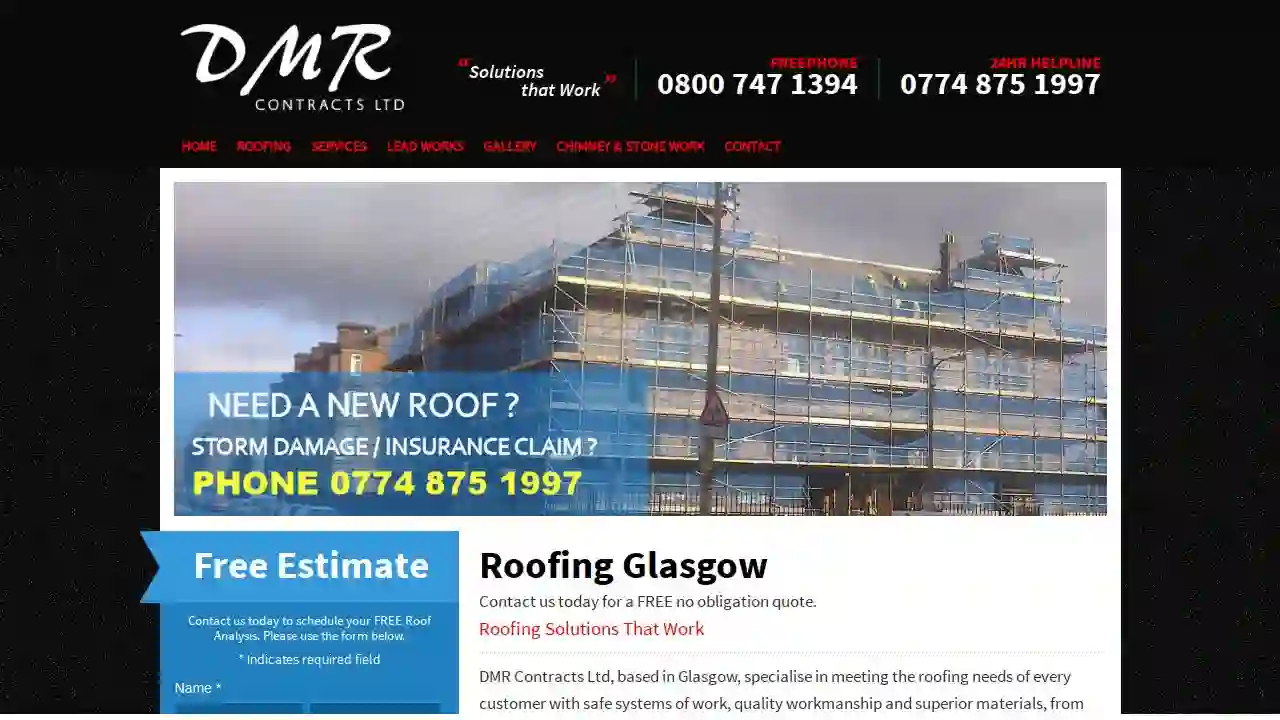
Glasgow's Finest Roofing Company
32 reviews100 Holloway Head, Birmingham, B1 1AA, GBDMR Contracts is a leading provider of commercial construction services in the UK. With over 20 years of experience, we have a proven track record of delivering high-quality projects on time and within budget. Our team of expert professionals is dedicated to providing our clients with the best possible service. We offer a wide range of services, including new build, refurbishment, fit-out, and maintenance. We are committed to using the latest technologies and techniques to ensure that our projects are completed to the highest standards. At DMR Contracts, we understand that every project is unique. That's why we take the time to get to know our clients and their needs. We work closely with them throughout the entire project lifecycle, from initial concept to final handover. Our goal is to exceed our clients' expectations and build long-lasting relationships. We are proud to have a strong reputation for quality, reliability, and customer satisfaction. Our commitment to excellence has earned us the trust of many leading businesses in the UK.
- Services
- Why Us?
Get Quote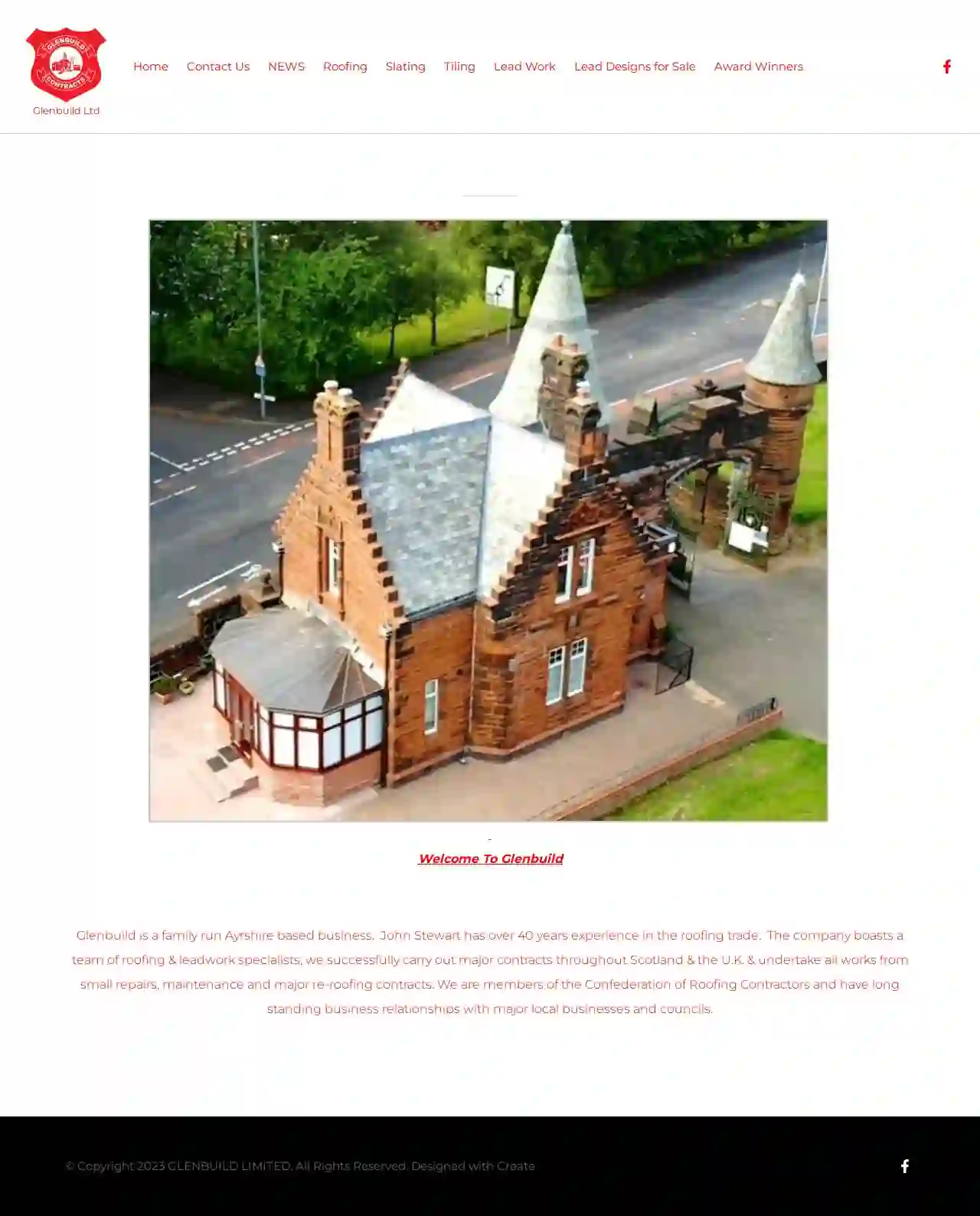
Glenbuild Roofing Contracts Ltd
48 reviewsAyr, GBGlenbuild Ltd is a family run business based in Ayrshire. John Stewart has over 40 years experience in the roofing trade. The company boasts a team of roofing & leadwork specialists, successfully carrying out major contracts throughout Scotland & the U.K. They undertake all works from small repairs, maintenance and major re-roofing contracts. Glenbuild is a member of the Confederation of Roofing Contractors and has long standing business relationships with major local businesses and councils.
- Services
- Why Us?
- Gallery
Get Quote
WTM services
52 reviewsGBWTM SERVICES is a leading and reputable Roofing and roughcasting Company serving Scotland. Since opening for business, we've taken a comprehensive approach to project management, providing our clients with a wide range of services to cover their needs. We cover all areas of Glasgow, Edinburgh, Dundee and Fife and surrounding areas. We offer expert advice on all things related to roofing, and our team of skilled and experienced roofers has been serving property owners in Glasgow, Edinburgh, Fife and Dundee and surrounding borders for over a decade. Our roofing and roughcasting specialists are knowledgeable and can offer solutions to a variety of roof-related problems, including new roof constructions, roof replacements, roof repairs, flashing repairs, guttering, fascia, and soffit board services and roughcasting. With the rising cost of energy, it is essential to undertake timely roof replacements and repairs to maintain your property's energy efficiency and save on energy bills. At WTM SERVICES, we understand this and offer free expert advice and competitive quotes from our friendly team. We take pride in providing exceptional roofing services while maintaining a price advantage over other roofing companies in Glasgow and beyond. Our 5-star reviews and referrals are a testament to our commitment to our customers. We are dedicated to offering speedy and high-quality solutions to all your roofing and roughcasting problems. As your committed "ROOFERS NEAR ME" service in Glasgow, we understand that roofing problems can be urgent, particularly during periods of adverse weather. Therefore, we aim to provide quick and reliable services.
- Services
- Why Us?
- Gallery
Get Quote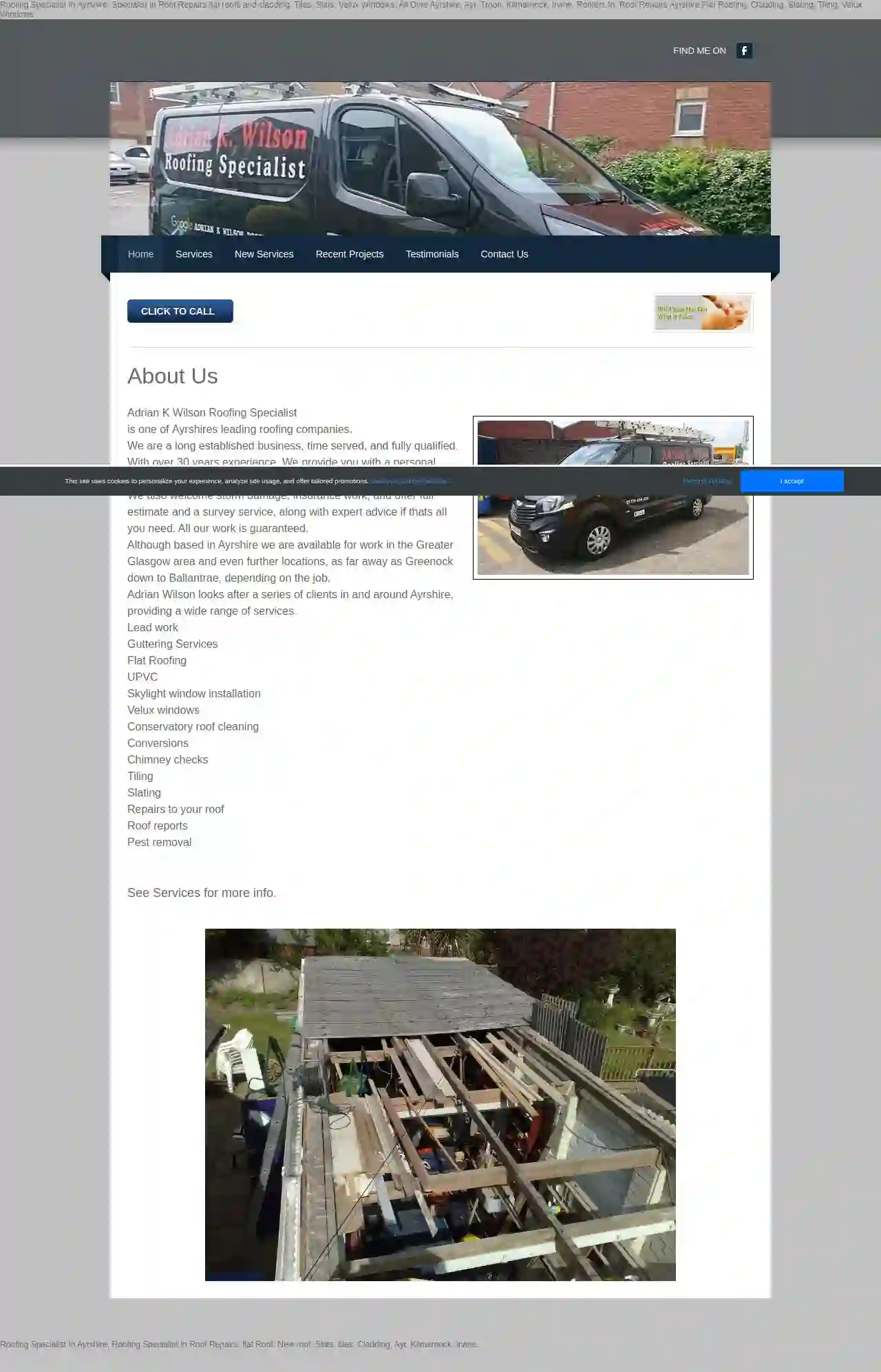
Adrian K Wilson Roofing Specialist
4.815 reviewsAyr, GBAdrian K Wilson Roofing Specialist is one of Ayrshire's leading roofing companies. We are a long established business, time served, and fully qualified. With over 30 years experience. We provide you with a personal service for all aspects of domestic and commercial roofing work. We also welcome storm damage, insurance work, and offer full estimate and a survey service, along with expert advice if that's all you need. All our work is guaranteed. Although based in Ayrshire, we are available for work in the Greater Glasgow area and even further locations, as far away as Greenock down to Ballantrae, depending on the job. Adrian Wilson looks after a series of clients in and around Ayrshire, providing a wide range of services. Lead work, Guttering Services, Flat Roofing, UPVC, Skylight window installation, Velux windows, Conservatory roof cleaning, Conversions, Chimney checks, Tiling, Slating, Repairs to your roof, Roof reports, Pest removal. See Services for more info.
- Services
- Why Us?
- Our Team
- Testimonials
- Gallery
Get Quote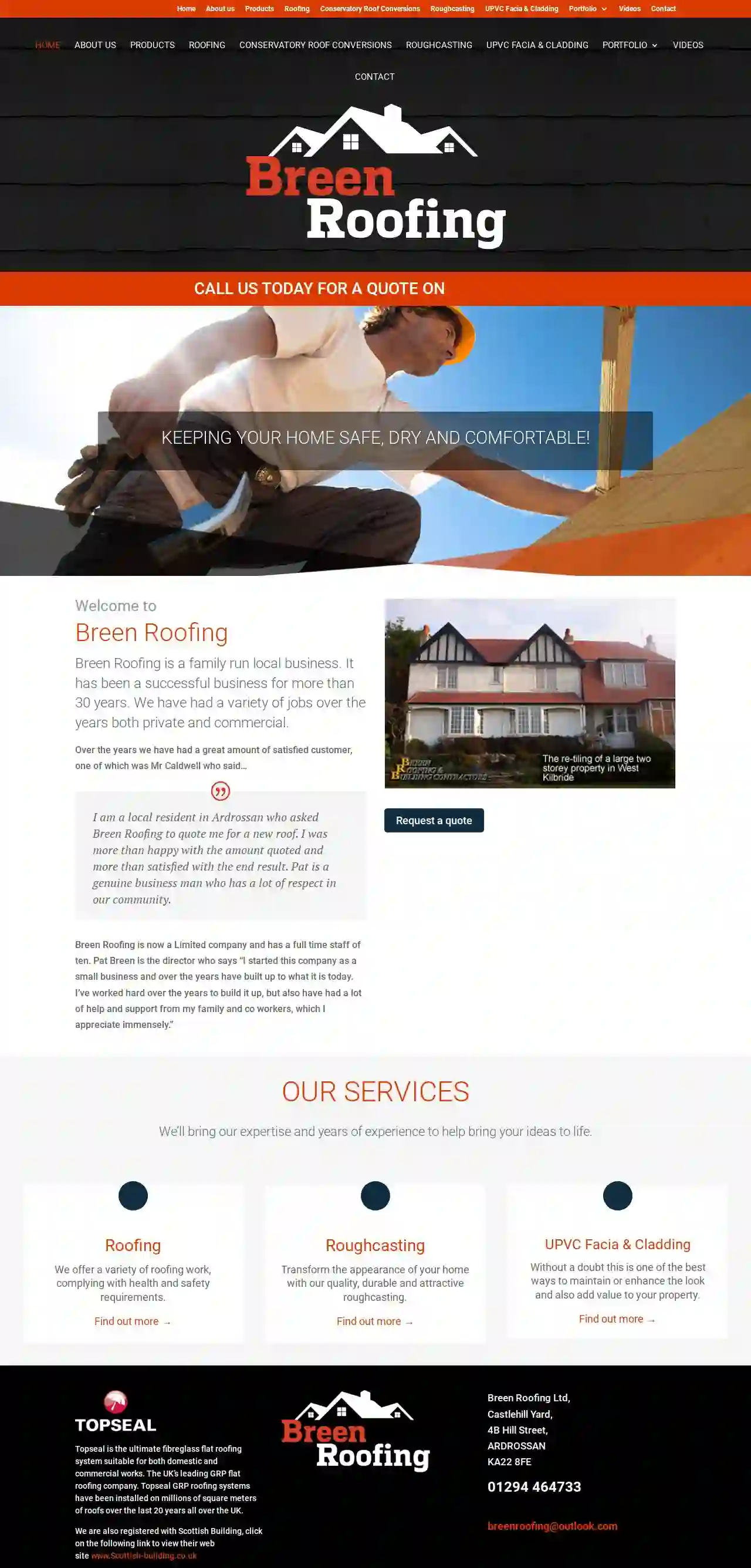
Breen Roofing
58 reviews4B Hill Street, Castlehill Yard, Ardrossan, KA22 8FE, GBBreen Roofing is a family-run local business with over 30 years of experience. We've successfully completed a variety of projects, both private and commercial. Our commitment to customer satisfaction is evident in the numerous positive testimonials we've received. One satisfied customer, Mr. Caldwell from Ardrossan, praised our competitive quotes and the high-quality workmanship. Breen Roofing has grown into a limited company with a dedicated team of ten employees. Pat Breen, the director, attributes the company's success to his hard work, the support of his family, and the dedication of his co-workers. We pride ourselves on providing a quality service, fast and reliable roofing solutions. Whether you need a new roof, roughcasting, UPVC facia and cladding, or a Topseal flat roofing system, our experienced team is here to help. Contact us today for a free quote and let us bring your roofing ideas to life.
- Services
- Why Us?
- Accreditations
- Our Team
- Testimonials
- Gallery
Get Quote
Over 12,314+ Roofers on our directory
Our roofing experts operate in Rothesay & surroundings!
Roofyng.co.uk has curated and vetted the Best Roofing Businesses near Rothesay. Find a reliable pro today.
Frequently Asked Questions About Roofing Companies
- Listed Buildings: Buildings with historical or architectural significance.
- Conservation Areas: Areas with special architectural or historical character.
- Changes to Roof Design: If you're making significant alterations to the roof's design, such as adding a dormer window or changing the pitch.
- Leaks or Water Stains: Water stains on ceilings or walls, dripping water, or dampness in the attic.
- Missing, Cracked, or Curled Shingles: Inspect for damaged or missing shingles, especially after a storm.
- Damaged Flashing: Look for rust, corrosion, or gaps in flashing around chimneys, vents, or skylights.
- Sagging or Uneven Rooflines: A sagging roof could indicate structural problems.
- Granule Loss: Excessive granules in gutters suggest aging asphalt shingles.
- Moss or Algae Growth: Can trap moisture and damage roofing materials.
- Asphalt Shingles: Popular, affordable, available in various styles (3-tab, architectural, etc.)
- Metal Roofing: Durable, long-lasting, energy-efficient, available in panels, shingles, or tiles.
- Tile Roofing: Clay, concrete, or slate; known for longevity, durability, and aesthetic appeal.
- Flat Roofing: EPDM rubber, TPO, PVC, modified bitumen, or built-up roofing (BUR).
- Slate: Natural stone, extremely durable, expensive, requires expert installation.
- Wood Shakes or Shingles: Natural wood, aesthetically pleasing, requires regular maintenance.
Do I need planning permission to replace my roof in the UK?
What are some common signs of roof damage?
What should I do with my old roof after replacement?
What are the different types of roofing materials?
Do I need planning permission to replace my roof in the UK?
- Listed Buildings: Buildings with historical or architectural significance.
- Conservation Areas: Areas with special architectural or historical character.
- Changes to Roof Design: If you're making significant alterations to the roof's design, such as adding a dormer window or changing the pitch.
What are some common signs of roof damage?
- Leaks or Water Stains: Water stains on ceilings or walls, dripping water, or dampness in the attic.
- Missing, Cracked, or Curled Shingles: Inspect for damaged or missing shingles, especially after a storm.
- Damaged Flashing: Look for rust, corrosion, or gaps in flashing around chimneys, vents, or skylights.
- Sagging or Uneven Rooflines: A sagging roof could indicate structural problems.
- Granule Loss: Excessive granules in gutters suggest aging asphalt shingles.
- Moss or Algae Growth: Can trap moisture and damage roofing materials.
What should I do with my old roof after replacement?
What are the different types of roofing materials?
- Asphalt Shingles: Popular, affordable, available in various styles (3-tab, architectural, etc.)
- Metal Roofing: Durable, long-lasting, energy-efficient, available in panels, shingles, or tiles.
- Tile Roofing: Clay, concrete, or slate; known for longevity, durability, and aesthetic appeal.
- Flat Roofing: EPDM rubber, TPO, PVC, modified bitumen, or built-up roofing (BUR).
- Slate: Natural stone, extremely durable, expensive, requires expert installation.
- Wood Shakes or Shingles: Natural wood, aesthetically pleasing, requires regular maintenance.